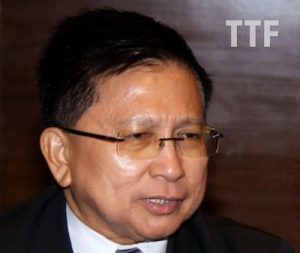The real reason Mahathir let’s Tommy Thomas and Richard Malanjum get away with murder

TTF: Here, let me shed some light on what’s truly going on (see news item far below).
First, Dr M gets the Yang di-Pertuan Agong to appoint Tommy Thomas and Richard Malanjum – both non-Muslims, both DAP leaning, both unlikely to support anything even remotely associated with Islam – to head the Attorney General’s Chambers (AGC) and the Judiciary respectively.
Then, he appoints another DAP leaning non-Muslim, Dato’ Liew Vui Keong, as Minister in the Prime Minister’s Department in charge of legal affairs.
Basically, that puts the entire system of justice under the care of DAP leaning non-Muslims, two of whom conspired with Lim Guan Eng to acquit the Finance Minister of corruption charges related to the purchase of a bungalow unit below market value (see video).
A couple of days back, the trio – Tommy, Richard and Liew – breached the Judges’ Code of Ethics by doing the bogey on stage together with controversial lawyer-cum-activist, Siti Kassim.
Their actions immediately brought to question the ability of our judges to keep in check the Malaysian executive and legislature, which, in the strictest sense, lack separation of powers.
On the 21st of January 2018, Malaysiaku Tanahairku wrote:
A judge simply cannot be seen doing in public what he (or she) thinks is permissible. He (or she) has to consider the broader implications of his (or her) actions even if those actions are well intended. One simply cannot surmise that because it is ok for a commoner to dance, there is nothing wrong if a judge were to do the same in public. The legal profession is such, that the actions of its practitioners reflect on judiciary and how members of public perceive it. At the end of the day, what matters most is not how well intentioned a judge is, but how well intentioned people think he (or she) is.

That, in essence, is what the fuss about Tommy Thomas and Richard Malanjum doing the cha-cha all boils down to. Recently, the duo was spotted bogeying on stage together with controversial lawyer-cum-activist Siti Kassim (see video below). These are among the highest ranking of office bearers we’re talking about, with Richard being the head of the Malaysian judiciary and Tommy, the principal legal advisor to the Government of Malaysia (GoM). There is no version of this in which the duo can come off unscathed thinking that the integrity of our judiciary is still in tact.
Due to their actions, the Malaysian system of justice now hangs in the balance, particularly since a minister in the Prime Minister’s department was himself seen doing the jiggy with them. That immediately brings to question the ability of our judges to keep in check the executive-legislature complex. There is no more telling if Tommy Thomas and Richard Malanjum are working with the PMO to ‘legalise’ crimes committed by ministers. The curious case of Lim Guan Eng serves to drive that point home and demonstrates just why the people are fed up with the way Tommy and Richard are doing things.
Mahathir didn’t seem to have a problem with Tommy, Richard and Liew despite their actions being to the detriment of our system of justice.
That’s because he wants the trio to do any damn thing they wish, which is brilliant, considering that he has complete disregard for the rule of law and wants the Chief Justice and Attorney-General be under his control.
Why?
Because he does not want a repeat of what happened in 1987.
Back then, the Kuala Lumpur High Court went against his wishes and granted Karpal Singh’s application to be released from detention under the now defunct Internal Security Act (ISA).
Following the release, Mahathir quickly amended the Federal Constitution of Malaysia in ways that divested the courts of power, giving them only such powers as Parliament might grant them.
In justifying the amendment, he said, “…the courts have decided that in enforcing the law they are bound by their interpretations and not by the reasons for which Parliament formulated these laws … lately the judiciary had seen fit to touch on matters which were previously regarded as solely within the executive’s jurisdiction.”
The amendment caused an uproar among members of judiciary who pressured the then Lord President of the Supreme Court, Tun Salleh Abas, into responding.
Within days, Salleh got a group of 20 Supreme and High Court judges to sign a letter of protest that underlined the judges’ disappointment “with the various comments and accusations made by the Honourable Prime Minister against the Judiciary.”
While the letter did not state the specific action that needed to be taken, it ended with an expression of “hope that all those unfounded accusations will be stopped.”
The letter was more than Mahathir could chew.
He wasted very little time in getting Tun Hamid Omar to convene a tribunal that charged Salleh with misconduct.
Feeling disgusted, Salleh undertook to challenge the constitutionality of the tribunal at the Kuala Lumpur High Court and applied for an interim stay against the tribunal until 4th of July 1988.
Initially, the request was denied.
However, after all five Supreme Court judges convened to reconsider the application, they granted Salleh an interlocutory order against the tribunal.
Following the verdict, Salleh’s solicitors proceeded to Parliament to hand over the order to Hamid but were shocked to find that the main gate to Parliament was locked.
When Salleh came to know about this, he sought assistance from the police to secure a safe passage for his lawyers who eventually got to hand over the order to Hamid.
For Mahathir, that was the final straw.
He immediately suspended all five Supreme Court judges, namely, Tan Sri Azmi Kamaruddin, Tan Sri Eusoffe Abdoolcader, Tan Sri Wan Hamzah Mohamed Salleh, Tan Sri Wan Suleiman Pawanteh and Datuk George Seah.
This effectively suspended the Supreme Court and prevented Salleh’s case against the tribunal from being heard.
Mahathir then got the tribunal to remove Salleh, Tan Sri Wan Sulaiman and Datuk George Seah from office before reinstating the remaining three judges on condition that they did not challenge the tribunal’s decision.
So you see, while Mahathir did eventually get what he wanted, he was forced to twist the arms of judiciary in full view of public and ended up putting this huge dent in his credibility.
Today, he’s grown wiser.
Today, he’s not risking another dent in his credibility but putting a few in Richard’s, Tommy’s and Liew’s.
Basically, he’s going to let them get away with murder.
Then, he will amend laws any way he sees fit before telling all and sundry that the laws were amended in line with Pakatan Harapan’s Manifesto.
Should anyone have a problem with these amendments, he will let Richard, Tommy and Liew take the heat.
That, in essence, is the Mahathir way of getting things done.

PUTRAJAYA: Over 100 laws will be enacted, amended, updated and repealed, said Minister in the Prime Minister’s Department (Law) Datuk Liew Vui Keong.
Liew said a list of over 100 legislative proposals which needed to be drafted, reformed, amended and repealed was tabled in a meeting which was chaired by him and attended by representatives of all ministries, government departments and agencies here today.
“The list has not been finalised and will be updated from time to time,” he said in a statement after the meeting.
Among the list of legislative acts and laws were the Dangerous Drugs Act 1952, the Security Offences (Special Measures) Act 2012, the Prevention of Crime Act 1959, the Potection Against Violence Act 2015, the Sedition Act 1948, the Printing Presses and Publications Act 1984 and the Peaceful Assembly Act 2012.
Other laws include the Communications and Multimedia Commission Act 1998, the Communications and Multimedia Act 1998, the Employment Act 1955, the Universities and University Colleges Act 1971, the Sexual Harassment Bill, the Child Act 2001 and the Child Care Centre Act 1984.
As for the proposed legislations which required drafting, renewal, amendment and reversal from the Prime Minister’s Department (JPM) were the Audit Act 1957, the Islamic Family Law (Federal Territories) Act 1984 and the Syariah Criminal Offences (Federal territories Areas Federation).
He said the proposals also included the Insolvency Act 1967, National Security Council Act 2016, Anti-Fake News Act 2018, Tabung Haji Haji Act 1995, Official Secrets Act 1972, the Ombudsman Malaysia Act and the drafting of the Independent Police Complaints and Misconduct Commission (IPCMC) Bill.
Liew said the list was submitted based on the Pakatan Harapan Manifesto and the 11th Malaysia Plan (RMK11).
He said the list would be tabled at the next Parliament session according to the appropriate time frame.
Source: NST Online
No comments:
Post a Comment